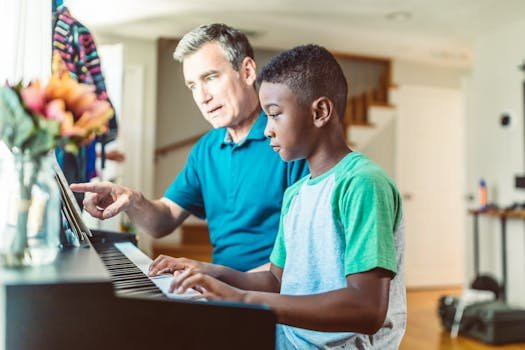One of the biggest secrets to success in piano lessons? It’s not a fancy keyboard or hours of practice—it’s you, the parent.
When children are first starting out, their musical growth depends heavily on support at home and parent involvement in piano practice. Even just 10–15 minutes a day of parent involvement in piano practice can make a world of difference. You don’t need a musical background—just a willingness to show up, check in, and help make practice feel positive and purposeful.

💬 3 Simple Things Parents Can Do After Each Lesson
Building a great piano habit doesn’t stop at the studio door. Consistent parent involvement in piano practice helps reinforce what was learned in the lesson and keeps kids motivated throughout the week. Here’s how you can reinforce learning and set your child up for a great week of practice:
1. Ask About the Lesson
Each week, I write a quick note on an “Ask me about…” page in your child’s piano binder. This highlights something new, fun, or important we worked on during their lesson. Asking your child about it not only shows you’re interested—it also helps them verbalize what they’ve learned, which boosts retention and excitement!
2. Look Over the Assignment Sheet Together
I include clear, easy-to-follow instructions for each song, technique exercise, and theory page. Take a moment with your child to read through it. Better yet, ask them to explain what they’re supposed to do. Talking through assignments helps reinforce what was taught and makes practice feel more structured and intentional.
3. Trim Those Nails!
It may sound simple, but it’s essential. Playing with long nails makes proper technique almost impossible. It causes fingers to slip off the keys, creates unwanted clicking sounds, and leads to frustration. Keeping nails short means your child can use the right part of their fingertips, improving control and tone.
🎵 Create a Mini Pre-Practice Ritual
Before jumping into the music, help your child ease into “piano brain” with a quick warm-up routine. Something as simple as a big stretch to the sky, a gentle arm flop, and a few wrist rolls is all it takes. These movements get their body ready to play and signal to their brain: “It’s time for music now.” Over time, this little routine becomes a comforting and effective trigger for focus.
💡 Why Parent Involvement in Piano Practice Matters
When parents stay engaged in their child’s musical journey, it shows the child that practice is important and worth prioritizing. Kids are more motivated when they feel supported, and regular encouragement at home builds both musical skill and confidence.
Research shows that parent involvement in piano practice leads to better consistency, stronger practice habits, and longer-term commitment to lessons. Plus, parent involvement in piano practice creates opportunities for connection and celebration as you watch your child grow musically.
🤝 Be the Practice Coach (Even if You’re Not a Musician)
You don’t have to sit through every single practice session—but consistent parent involvement in piano practice, especially in the first few years, is incredibly valuable.
Kids left on their own tend to run through a song a couple of times—mistakes and all—and call it done. But when you’re nearby, you can help them slow down, spot tricky spots, and give those areas the attention they need. This not only leads to better playing—it also teaches important life skills like perseverance and problem-solving.
🧠 What Does Practice Coaching Look Like?
Not sure how to help during practice time? Try these simple strategies:
- Clap and count tricky rhythms out loud before playing
- Isolate one challenging measure and play it slowly five times, gradually speeding up the tempo after it’s played correctly a few times
- Use a timer and turn it into a mini focus challenge
- Help your child make flashcards with the notes that they’ve learned (drawing the notes helps them stick in the brain better!), then set a timer and go through them — try to beat that time tomorrow!
- Record their playing and listen back together to spot improvements
You don’t need a music degree to do these things—just your time and encouragement. Your presence makes a big difference.
One of the most rewarding moments for a young pianist (and their parents!) is finally mastering a tough section after a week of patient practice. That feeling of “I did it!” is priceless—and it doesn’t happen without a little help from you along the way.
🙋♀️ Frequently Asked Questions
Do I need to sit with my child for every practice?
Not always, but especially in the first year, being present for most sessions provides structure and encouragement that young learners really benefit from.
What if I don’t know anything about music?
No problem! You don’t need to teach—you just need to support. Reading the assignment sheet together, helping with reminders, and listening are all incredibly helpful.
What’s a good daily practice goal?
For beginners, 10–15 focused minutes a day is a great starting point. Consistency is more important than long practice sessions.
📝 Final Thoughts
Strong parent involvement in piano practice doesn’t have to mean hours at the piano or becoming a teacher yourself. A few intentional habits—checking the assignment sheet, asking about the lesson, helping with nail trims, and sitting in when you can—go a long way toward building confidence, skill, and a love for music.
At Playful Notes Piano Studio, I believe that parent involvement in piano practice helps make learning should be a joyful, shared experience. And when kids know their parents are on their team, the progress (and the fun!) really starts to happen.
Looking for more ways to support your young musician? Stay tuned to the blog for more tips and encouragement for families in Huntsville (and around the world!) navigating piano lessons! 🎶
Looking for a piano teacher in Huntsville, AL? Click here to learn more about Playful Notes Piano and Ms. Sara.
Ready to jump in? Click here to start enrolling today!

